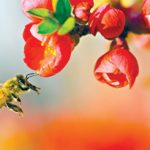
Residents and beekeepers are working with electric cooperatives to opt out of herbicide applications.

Residents and beekeepers are working with electric cooperatives to opt out of herbicide applications.
By Laura Marion The White House unveiled its federal honeybee protection plan less than a week after the U.S. Department of Agriculture reported that honeybee populations further declined by 40 percent between April 2014 and April 2015. The agency’s National…
By Laura Marion This May, the U.S. Environmental Protection Agency told Reuters news agency that it has finished a review of the health and environmental impacts of glyphosate — a chemical used in popular herbicides such as RoundUp — and…

As an assortment of pollutants leach into our lives, the harmful effects continue to surface in public health. Read about the connections between human health and environmental concerns associated with energy, pesticides and climate change. This article is featured in an Appalachian Voices webinar
By Amber Ellis A recent study from the University of California claims that pregnant women living within a mile of farms using popular agricultural pesticides were 60 percent more likely to have a child with developmental delays or autism. And…

As we prepared this agriculture-themed issue of The Appalachian Voice, we couldn’t help but think of how to improve our own green thumbs. We took the following questions to Ruth Gonzalez and Meredith McKissick at the Organic Growers School, a…

By Davis Wax More than 30 percent of managed bee colonies in the United States perished this past winter, and beekeepers are looking for answers. While parasites, viruses and malnutrition can be factors in entire hives dying, evidence is building…